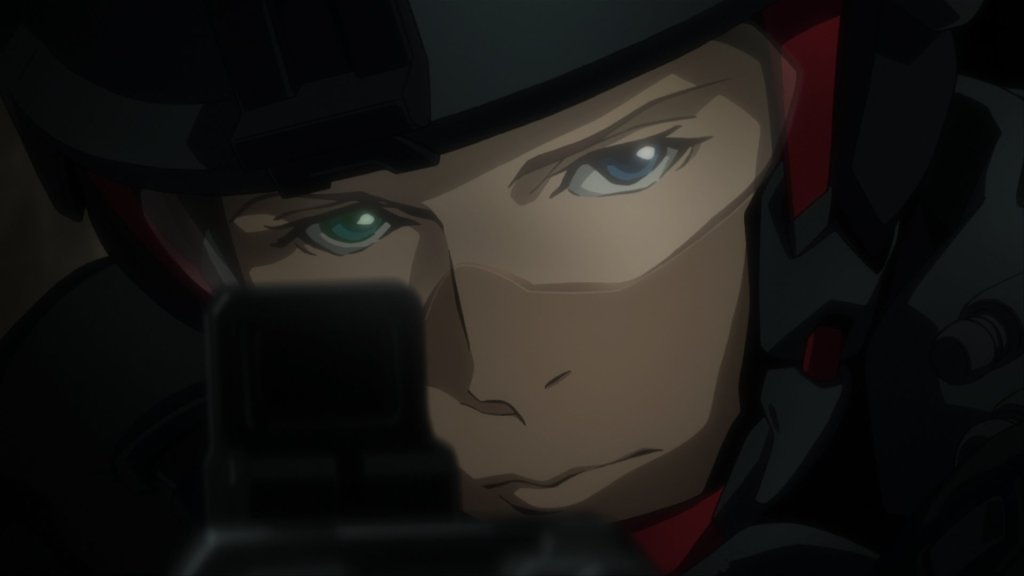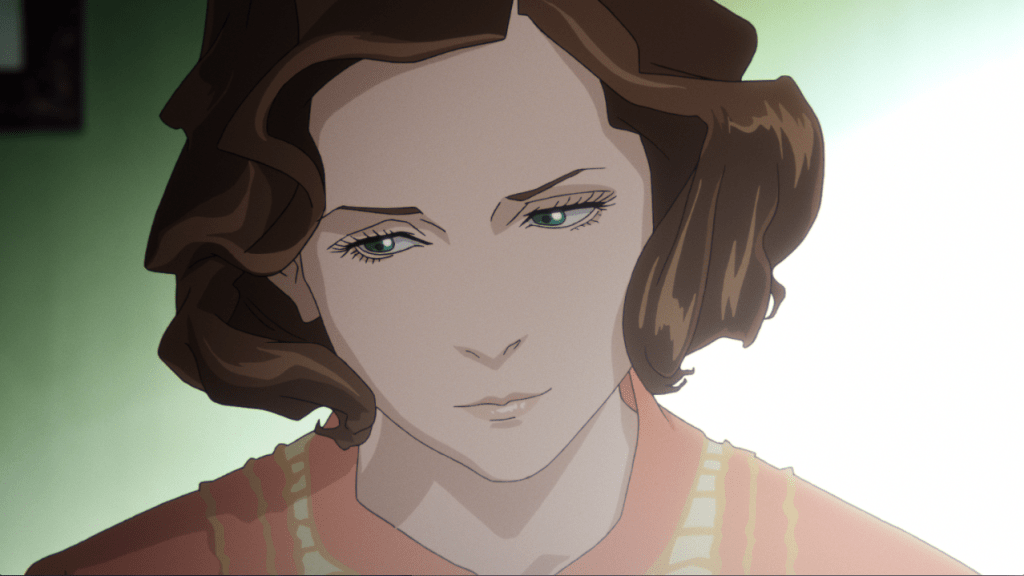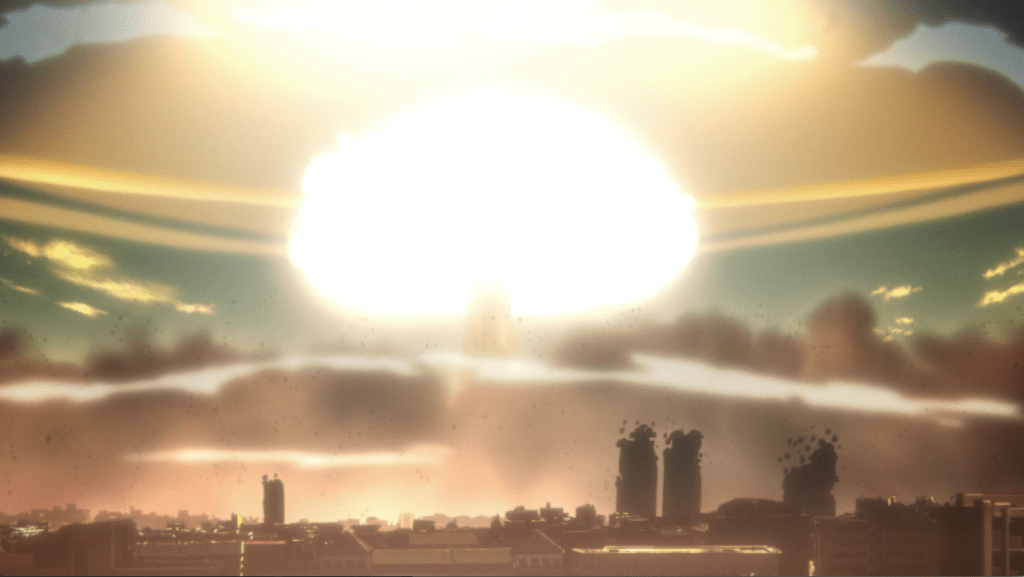D
darkstorm
Guest
Project Itoh (pen name for Satoshi Ito) may have had his life cut tragically short due to cancer and only have four novels to his name, but he had a talent for creating fascinating and layered stories. From literary characters crossing over in a zombie apocalypse to dystopian futures questioning the idea of human consciousness, it’s not surprising that Noitamina went to great lengths to get his three original works adapted into full length anime films. Two of them have already been released in the UK – The Empire of Corpses and Harmony – but the adaptation of Itoh’s debut novel, Genocidal Organ, was met with many production delays. This was due to the original animation studio Manglobe going bankrupt, cancelling the original release date of late 2015 but thanks to the original staff being passionate about the project, they created a new studio to finish the film and it was finally released earlier this year in Japan. Now Genocidal Organ is making its way across to UK cinemas, completing the trio of films and showing exactly what made Project Itoh’s debut novel so critically beloved in Japan.
The story is set in 2020, in an alternative reality where Bosnia’s capital city, Sarajevo, has been wiped out due to terrorist attacks, setting a wave in motion for the Western world to counter terrorism by transforming it into surveillance states. However, outside of their borders, many countries are suffering waves of genocide with a man named John Paul somehow at the centre of it all. The American government sends intelligence agent Clavis Shepherd and his team to track down this mysterious man to stop it once and for all.

For a movie that’s based upon a book that was released back in 2007, it’s fascinating and also frightening to see how relevant the original source material is today. Genocidal Organ paints a credible future, aside from a few technological jumps, where the Western world has sacrificed its freedom – with ID chips implanted into everyone, excessive number of cameras in all cities and physical cash no longer exchanged but instead thumb-prints to buy anything – in exchange for safety from terrorists. It’s a price that you can imagine many would be happy to pay, considering our current reality of the recent terror attacks in Manchester and London. However, the movie isn’t simply saying ‘war’ or ‘terrorism’ are bad, because of course they are; instead it questions how we perceive them and choose to compartmentalize it. The Manchester atrocity, for example, was a huge tragedy but if this happened in say, Taiwan, would we in the UK be as highly affected? Unless we knew of a UK person who was caught in the crossfire or was the cause of it, it’s doubtful for the majority. What if we decide to choose our well-being over our privacy, does this give us the right to attack or judge countries that do not? What about how we go about dealing with the terrorists that carry out these horrific attacks, how can killing one mass group of people be differentiated from another? Genocidal Organ raises a lot of these heavy and layered themes, and as with anything related to terrorism (regardless of what some may think) there is no easy or just the one answer. The film makes several references to 9/11 and how the Nazis excused their actions as ‘just doing their job’ during World War II, to really ground the arguments and points that the film sets out to make. The closing statement doesn’t try to provide a clear answer either, instead it weaves its ideas and multiple angles of the situation into the narrative and leaves it for the audience to really soak it in. As a result, the film is very heavy on dialogue, especially from the main villain and our protagonist who isn’t your typical white-male supremacy action-led hero. On one hand he’s very educated, artistically cultured and is not afraid to ask questions or take charge; in contrast to this we see through his first-person view for the majority of the action scenes of him killing many people including children without so much as blinking. It’s not just to show the brutality of war but how emotionally numb our lead is, a scary view resulting from extensive training and manipulated by nano-machines to not feel pain or PTSD. It’s the back and forth between the philosophical conversations and the ruthless action scenes (of which there are only a few) that really drum in the film’s tone and get you thinking about them without sensationalizing it to the point of missing the themes entirely. Although the philosophical side of the film is executed well, one weak link is the villain himself. John Paul has an interesting backstory and motive admittedly, however his ultimate technique and supposed hints at manipulating the hero are built up but then not satisfactorily executed; they paint it like a magnum opus waiting to happen but the ending is much quieter and sombre than expected.
Outside of the heavy themes however, the movie does portray effectively what the future could look like when higher security measures and technology are in place, and it’s a believable picture, if underdeveloped in the movie. For example, in an early scene we’re shown Clavis having a jog, when all of a sudden, we see a ‘ghost’ of him running out alongside him. Those who play Mario Kart would visually recognise it as a record of a previous run he did, comparing his current pace alongside it. It’s a brief, inconsequential scene but says so much about the technological possibilities that could be very probable in our reality. There’s other small little tidbits scattered across the film but none of it is explained or expanded in greater detail, perhaps something that is in the original novel (which is available in the UK).

The most squandered potential in the film however would have to be Lucia Skroupova, an intelligent woman stuck between the two main men and their world views; she has a complex and tragic story, one that would’ve been nice to explore further but sadly for the second half of the film she’s relegated to the background and falls victim to the same tropes that most female characters suffer from in male-led action/spy flicks. I won’t spoil what but if you’ve seen enough of them you can easily guess which ones.
If you’ve seen the other two Project Itoh movies and are wondering how they compare, Genocidal Organ isn’t as fun or crazy as Empire of Corpses, instead it has more in common with Harmony especially when it comes to pacing and having the dialogue outweigh the action. However, Harmony suffers from an inactive hero who narrates with an air of self-indulgence, sadly not saved by the thought-provoking themes and ideas within the movie. Genocidal Organ has a more agreeable and proactive protagonist, and we’re spared his inner monologue for the majority of the time, with a stronger villain to balance him out as well.
The animation quality is very striking; you can tell that the staff who transferred from one collapsed company to form another to finish this work were really passionate about the film they were working on. Everything is incredibly fluid, with extremely detailed work lavished on the characters to give them that ‘Western’ edge, and even with them all speaking Japanese they have them writing clear and readable English (jarring at first, but also clever in a way). The film takes place in several countries, including the Czech Republic and America, all brought to life on screen with plenty of depth and definition; it’s easy to see that they did a lot of research into each country to portray them correctly and vividly. Out of all the Project Itoh movies, this one definitely wins in terms of animation quality.
Due to its content, Genocidal Organ is going to hit home for a lot of people and it’s most certainly not a film you’d watch to perk your spirits up or one that provides a hopeful conclusion, but it’s to be admired for tackling said themes with honesty and maturity. At the very least it can be respected for the animation quality and intuitive view of what the future could look like. Whether you’re a Project Itoh fan or not, this one is worth experiencing in cinemas.
Genocidal Organ is in UK cinemas from 12th July by Anime Ltd, purchase your tickets here.

Continue reading...
The story is set in 2020, in an alternative reality where Bosnia’s capital city, Sarajevo, has been wiped out due to terrorist attacks, setting a wave in motion for the Western world to counter terrorism by transforming it into surveillance states. However, outside of their borders, many countries are suffering waves of genocide with a man named John Paul somehow at the centre of it all. The American government sends intelligence agent Clavis Shepherd and his team to track down this mysterious man to stop it once and for all.

For a movie that’s based upon a book that was released back in 2007, it’s fascinating and also frightening to see how relevant the original source material is today. Genocidal Organ paints a credible future, aside from a few technological jumps, where the Western world has sacrificed its freedom – with ID chips implanted into everyone, excessive number of cameras in all cities and physical cash no longer exchanged but instead thumb-prints to buy anything – in exchange for safety from terrorists. It’s a price that you can imagine many would be happy to pay, considering our current reality of the recent terror attacks in Manchester and London. However, the movie isn’t simply saying ‘war’ or ‘terrorism’ are bad, because of course they are; instead it questions how we perceive them and choose to compartmentalize it. The Manchester atrocity, for example, was a huge tragedy but if this happened in say, Taiwan, would we in the UK be as highly affected? Unless we knew of a UK person who was caught in the crossfire or was the cause of it, it’s doubtful for the majority. What if we decide to choose our well-being over our privacy, does this give us the right to attack or judge countries that do not? What about how we go about dealing with the terrorists that carry out these horrific attacks, how can killing one mass group of people be differentiated from another? Genocidal Organ raises a lot of these heavy and layered themes, and as with anything related to terrorism (regardless of what some may think) there is no easy or just the one answer. The film makes several references to 9/11 and how the Nazis excused their actions as ‘just doing their job’ during World War II, to really ground the arguments and points that the film sets out to make. The closing statement doesn’t try to provide a clear answer either, instead it weaves its ideas and multiple angles of the situation into the narrative and leaves it for the audience to really soak it in. As a result, the film is very heavy on dialogue, especially from the main villain and our protagonist who isn’t your typical white-male supremacy action-led hero. On one hand he’s very educated, artistically cultured and is not afraid to ask questions or take charge; in contrast to this we see through his first-person view for the majority of the action scenes of him killing many people including children without so much as blinking. It’s not just to show the brutality of war but how emotionally numb our lead is, a scary view resulting from extensive training and manipulated by nano-machines to not feel pain or PTSD. It’s the back and forth between the philosophical conversations and the ruthless action scenes (of which there are only a few) that really drum in the film’s tone and get you thinking about them without sensationalizing it to the point of missing the themes entirely. Although the philosophical side of the film is executed well, one weak link is the villain himself. John Paul has an interesting backstory and motive admittedly, however his ultimate technique and supposed hints at manipulating the hero are built up but then not satisfactorily executed; they paint it like a magnum opus waiting to happen but the ending is much quieter and sombre than expected.
Outside of the heavy themes however, the movie does portray effectively what the future could look like when higher security measures and technology are in place, and it’s a believable picture, if underdeveloped in the movie. For example, in an early scene we’re shown Clavis having a jog, when all of a sudden, we see a ‘ghost’ of him running out alongside him. Those who play Mario Kart would visually recognise it as a record of a previous run he did, comparing his current pace alongside it. It’s a brief, inconsequential scene but says so much about the technological possibilities that could be very probable in our reality. There’s other small little tidbits scattered across the film but none of it is explained or expanded in greater detail, perhaps something that is in the original novel (which is available in the UK).

The most squandered potential in the film however would have to be Lucia Skroupova, an intelligent woman stuck between the two main men and their world views; she has a complex and tragic story, one that would’ve been nice to explore further but sadly for the second half of the film she’s relegated to the background and falls victim to the same tropes that most female characters suffer from in male-led action/spy flicks. I won’t spoil what but if you’ve seen enough of them you can easily guess which ones.
If you’ve seen the other two Project Itoh movies and are wondering how they compare, Genocidal Organ isn’t as fun or crazy as Empire of Corpses, instead it has more in common with Harmony especially when it comes to pacing and having the dialogue outweigh the action. However, Harmony suffers from an inactive hero who narrates with an air of self-indulgence, sadly not saved by the thought-provoking themes and ideas within the movie. Genocidal Organ has a more agreeable and proactive protagonist, and we’re spared his inner monologue for the majority of the time, with a stronger villain to balance him out as well.
The animation quality is very striking; you can tell that the staff who transferred from one collapsed company to form another to finish this work were really passionate about the film they were working on. Everything is incredibly fluid, with extremely detailed work lavished on the characters to give them that ‘Western’ edge, and even with them all speaking Japanese they have them writing clear and readable English (jarring at first, but also clever in a way). The film takes place in several countries, including the Czech Republic and America, all brought to life on screen with plenty of depth and definition; it’s easy to see that they did a lot of research into each country to portray them correctly and vividly. Out of all the Project Itoh movies, this one definitely wins in terms of animation quality.
Due to its content, Genocidal Organ is going to hit home for a lot of people and it’s most certainly not a film you’d watch to perk your spirits up or one that provides a hopeful conclusion, but it’s to be admired for tackling said themes with honesty and maturity. At the very least it can be respected for the animation quality and intuitive view of what the future could look like. Whether you’re a Project Itoh fan or not, this one is worth experiencing in cinemas.
Genocidal Organ is in UK cinemas from 12th July by Anime Ltd, purchase your tickets here.

Continue reading...
